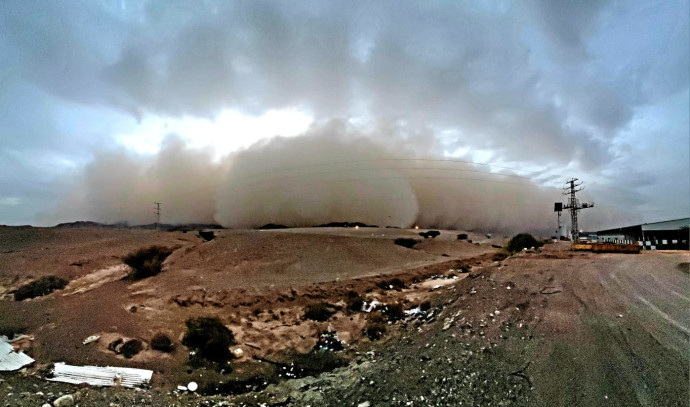The extreme heat that has been plaguing Israel and much of the rest of the Northern Hemisphere for over a week can double the risk of fatal heart attacks, especially if sand and other fine-particulate pollution come with it.
An analysis of more than 202,000 heart attack deaths between 2015 and 2020 in a single Chinese province found that days that had extreme heat, extreme cold, or high levels of fine particulate matter (PM2.5) air pollution were significantly associated with the risk of death from a heart attack, especially in women and older adults. The greatest increase in the risk of death from heart attack was seen on days that had the combination of extreme heat and high levels of PM2.5.
The days with extreme heat were associated with an increased risk of heart attack death in women vs. men, and in older adults than in younger adults. Older adults were also at a greater risk of heart attacks compared to younger adults during days with extreme cold or high levels of PM2.5.
As extreme temperatures intensify, so do dangerous health consequences
The study has just been published in the American Heart Association’s flagship journal Circulation under the title “Extreme Temperature Events, Fine Particulate Matter, and Myocardial Infarction Mortality.”
“Extreme temperature events are becoming more frequent, longer, and more intense, and their adverse health effects have drawn growing concern. Another environmental issue worldwide is the presence of fine particulate matter in the air, which may interact synergistically with extreme temperatures to adversely affect cardiovascular health,” said epidemiology Prof. Yuewei Liu of the School of Public Health at Sun Yat-sen University in Guangzhou, China. “However, it remains unknown if and how co-exposure to extreme temperatures and fine particulate pollution might interact to trigger a greater risk of death from heart attack, which is an acute response potentially brought on by an acute scenario and a great public health challenge due to its substantial disease burden worldwide.”
To examine the impact of extreme temperatures with and without high levels of fine particulate pollution, the researchers analyzed 202,678 heart attack deaths over a period of six years that occurred in Jiangsu province, a region with four distinct seasons and a wide range of temperatures and fine particulate pollution levels. The deaths were among older adults with an average age of 77.6 years; 52% were older than age 80; and 52% were male. Particulate exposure on the day of each death and one day before death were included in the analysis.
Extreme temperatures were gauged according to the daily heat index for an area that integrates both heat and humidity. Particulate levels were considered high on any day with an average level of more than 37.5 micrograms per cubic meter.
Reducing extreme temperatures and fine particulate pollution exposure could reduce the risk of heart attacks
“Our findings provide evidence that reducing exposure to both extreme temperatures and fine particulate pollution may be useful to prevent premature deaths from heart attack, especially for women and older adults,” Liu said.
The researchers estimated that about 2.8% of heart attack deaths could be attributed to the combination of extreme temperatures and high levels of fine particulate pollution.
People who want to be safer should follow weather forecasts, stay indoors inside when temperatures are extreme, use fans and air conditioners during hot weather, dress appropriately for the weather, drink plenty of water, and install curtains or window blinds to reduce indoor temperatures,” said Liu. “Using an air purifier in the house, wearing a mask outdoors, staying clear of busy highways when walking, and choosing less-strenuous outdoor activities may also help to reduce exposure to air pollution on days with high levels of fine particulate pollution.”


